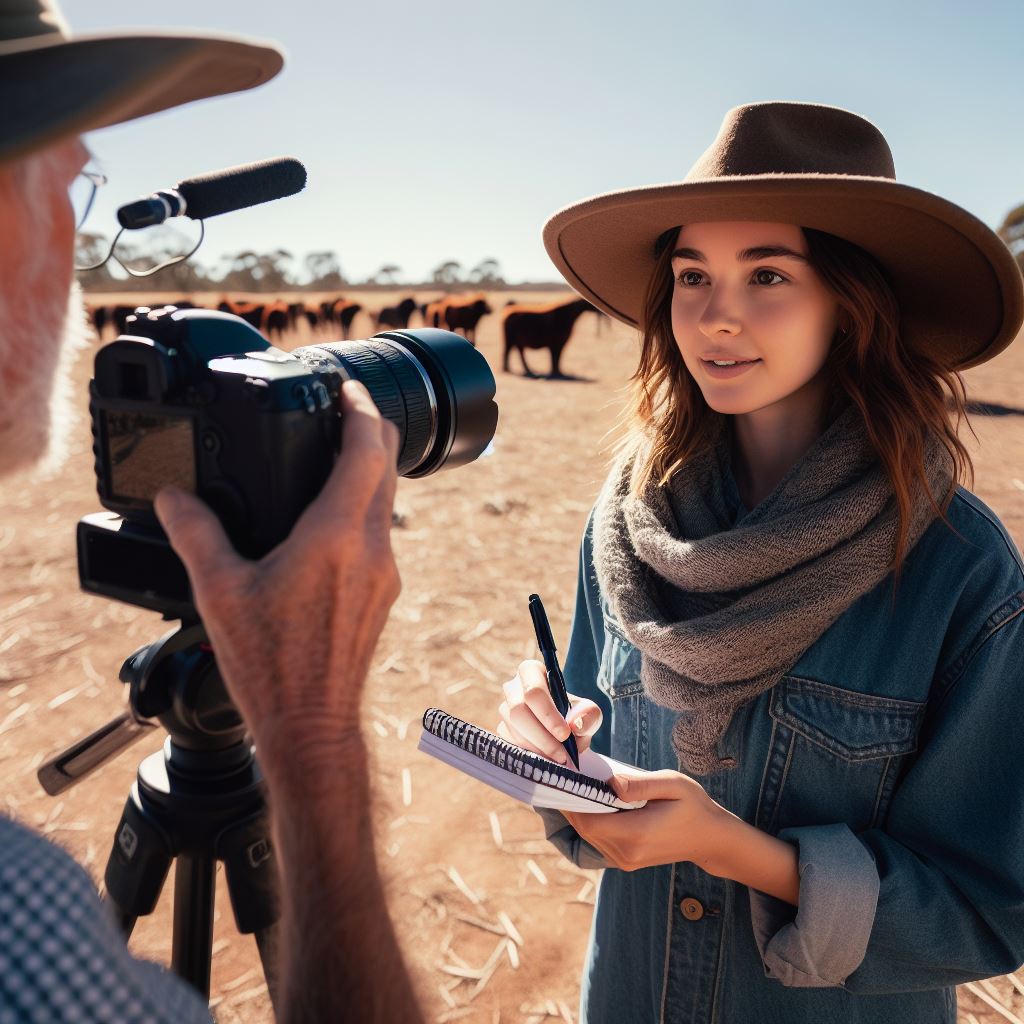Introduction
Journalism is a crucial profession in Australia, serving as a pillar of democracy and providing the public with accurate information.
In this blog post, we will explore the process of breaking into journalism in Australia.
From the importance of journalism to an overview of the content, this section will provide valuable insights for aspiring journalists.
Importance of journalism in Australia
In Australia, journalism plays a vital role in shaping public opinion and holding those in power accountable. It serves as a watchdog, uncovering stories that would otherwise remain hidden and giving a voice to the voiceless.
Overview of the blog post
In this blog post, we will cover various aspects of breaking into journalism, including the education and skills required, the different types of journalism, and the challenges that aspiring journalists may face.
We will also provide tips and advice on how to navigate the competitive landscape and secure employment in the industry.
Whether you are a student considering a career in journalism or a professional looking to switch careers, this blog post will provide you with the necessary guidance and resources to help you succeed.
So, let’s dive into the world of journalism in Australia and discover the path to becoming a successful journalist.
Types of Journalism in Australia
When it comes to pursuing a career in journalism in Australia, it’s important to understand the different types of journalism available. Here, we discuss the three main types: print journalism, broadcast journalism, and online journalism.
Print Journalism
Print journalism refers to the traditional form of journalism found in newspapers and magazines. Journalists in this field are responsible for conducting research, investigating stories, and writing articles for print publications.
They tackle a variety of beats, such as politics, business, sports, and entertainment.
Broadcast Journalism
Broadcast journalism involves reporting news and stories through audio and visual mediums, such as television and radio. Journalists in this field often work as news anchors, reporters, or correspondents.
They must have excellent communication skills, the ability to think on their feet, and the talent to present information in a concise and engaging manner.
Online Journalism
With the advent of the internet, online journalism has become increasingly popular in Australia. Online journalists publish news articles and stories exclusively on websites, blogs, and social media platforms.
They often use multimedia elements, such as videos and infographics, to enhance the reader’s experience. Online journalism provides opportunities for more interactive and engaging content.
Each type of journalism offers unique opportunities and challenges. Here are some factors to consider if you’re looking to break into the journalism industry in Australia
Skill Set
Different types of journalism require different skill sets. Print journalists need strong writing and research skills, while broadcast journalists should have excellent presentation and communication abilities.
Online journalists should be proficient in digital media and have knowledge of online platforms.
Technology
In today’s digital age, journalists are expected to be familiar with the latest technology and multimedia tools. Keeping up with advancements in digital journalism is crucial for success in the industry.
Networking
Building connections is vital in the journalism industry. Attend industry events, join professional organizations, and network with other journalists to create opportunities and stay up-to-date with the industry trends.
Your Personalized Career Strategy
Unlock your potential with tailored career consulting. Get clear, actionable steps designed for your success. Start now!
Get StartedInternships and Work Experience
Getting hands-on experience through internships or work experience placements is essential for breaking into journalism. Many news organizations offer internships to aspiring journalists, providing valuable real-world experience and a chance to build a portfolio.
Adaptability
Journalism is an ever-evolving field, so it’s important to be adaptable and open to learning new skills. Embracing change and staying updated with industry trends will set you apart from the competition.
Breaking into journalism in Australia requires determination, hard work, and a passion for storytelling. By understanding the different types of journalism and the skills required for each, you can take steps to prepare yourself for a successful career in the industry.
Stay motivated, keep writing, and seize every opportunity that comes your way.
Education and Qualifications
Journalism is a dynamic and competitive field that requires not only passion but also the right education and qualifications to succeed.
In this section, we will explore the essential aspects of breaking into journalism in Australia, focusing on the significance of journalism degrees and courses, the skills required for journalism, and the value of internships and work experience.
Journalism Degrees and Courses
- Pursuing a journalism degree is a common path taken by aspiring journalists in Australia.
- Universities across the country offer various journalism programs, providing students with a comprehensive understanding of the field.
- These courses equip students with theoretical knowledge, practical skills, and a foundation in ethical journalism practices.
- One of the most recognized journalism degrees in Australia is Bachelor of Journalism, which covers topics like news reporting, feature writing, and media law.
- Apart from bachelor’s degrees, there are also postgraduate courses available for individuals who want to specialize and further enhance their skills in specific areas of journalism.
Skills Required for Journalism
- Journalism demands a diverse range of skills to excel in the industry.
- Excellent written and verbal communication skills are indispensable for journalists as they need to convey information accurately and effectively.
- Being curious and possessing research skills are vital, allowing journalists to dig deep and uncover compelling stories.
- Strong interviewing and interpersonal skills enable journalists to connect with their sources and gather reliable information.
- Journalists should develop critical thinking abilities and an analytical mindset to evaluate information and present unbiased reports.
- Adaptability is crucial in journalism, as professionals often work under tight deadlines and in rapidly changing environments.
- Proficiency in multimedia platforms and digital tools has become increasingly important in the digital age of journalism.
- Ethical decision-making and a strong sense of integrity are fundamental qualities that journalists must uphold to maintain public trust.
Internships and Work Experience
- Internships offer invaluable opportunities for aspiring journalists to gain hands-on experience in the field.
- Many media organizations provide internships, allowing students and recent graduates to learn from professionals and build their portfolios.
- These internships can be highly competitive, and securing one can significantly enhance job prospects in the future.
- Work experience in journalism is highly regarded, as it demonstrates a practical understanding of the professional environment and industry practices.
- Freelancing or contributing to independent media outlets can also provide valuable experience and enable journalists to establish a network of contacts.
Therefore, education and qualifications play a crucial role in breaking into journalism in Australia. Pursuing a journalism degree equips individuals with the necessary knowledge and skills, while internships and work experience provide practical exposure and industry connections.
It is important to remember that journalism is a rapidly evolving profession that requires continuous learning and adaptation to keep up with the changing media landscape.
Read: Australian Music Awards: A Closer Look
Building a strong portfolio
Importance of having a portfolio
Having a strong portfolio is crucial when breaking into the field of journalism in Australia. It serves as tangible proof of your skills and capabilities as a journalist.
A portfolio provides potential employers with a glimpse of what you can bring to the table and allows them to assess your writing style, versatility, and areas of expertise.
Without a compelling portfolio, it can be challenging to convince employers of your abilities, especially in a competitive industry like journalism.
Showcasing relevant work samples
When building your portfolio, it is important to showcase a diverse range of work samples that are relevant to the type of journalism you aim to pursue.
This could include news articles, feature stories, investigative reports, opinion pieces, or even multimedia projects such as podcasts or videos.
Highlighting your most impressive and impactful work will help potential employers see your range of skills and expertise.
It is essential to choose work samples that demonstrate your ability to conduct thorough research, deliver accurate information, and engage an audience.
Stand Out with a Resume That Gets Results
Your career is worth more than a generic template. Let us craft a resume and cover letter that showcase your unique strengths and help you secure that dream job.
Get HiredNetworking and attending industry events
Networking is key to establishing connections in the journalism industry and accessing potential opportunities.
Attending industry events, such as conferences, workshops, and panel discussions, allows you to meet experienced professionals and learn from their experiences.
Through networking, you may come across mentors or individuals who can provide valuable advice, guidance, and even job leads.
Additionally, attending these events enables you to stay updated on the latest trends, technologies, and changes within the industry.
Building a strong network will not only enhance your professional development but also open doors to future job prospects.
Essence, a strong portfolio is of utmost importance when breaking into journalism in Australia.
It allows potential employers to assess your skills and capabilities, showcasing relevant work samples that highlight your expertise.
Networking and attending industry events further enhance your chances of success, as they provide opportunities to connect with experienced professionals and access potential job leads.
By actively building a strong portfolio and establishing a strong network, you will be better equipped to break into the field of journalism in Australia.
Read: Music Production: A Guide for Aussies
Job opportunities in journalism
When it comes to breaking into journalism in Australia, there are various job opportunities available. Here are some of the avenues aspiring journalists can explore
Traditional media organizations
- Traditional media organizations such as newspapers, radio stations, and television networks still offer jobs in journalism.
- These organizations provide a structured work environment and opportunities for mentorship.
- Working for established media houses can offer stability and a chance to build a reputable portfolio.
- Job roles within traditional media include reporters, editors, producers, and news anchors.
- These roles often require a strong foundation in journalism principles and the ability to work under tight deadlines.
Digital news outlets
- With the rise of digital technology, many journalism opportunities have emerged in online news outlets.
- Digital news outlets include websites, blogs, and online-only publications.
- Working for digital news outlets offers unique opportunities for multimedia storytelling and audience engagement.
- Journalists working in this field can cover a wide range of subjects and experiment with various storytelling formats.
- Roles in digital news outlets may involve generating content, managing social media accounts, and utilizing SEO techniques.
Freelancing and independent journalism
- Freelancing and independent journalism have become increasingly popular career paths in recent years.
- Freelancers have the freedom to choose their projects, working on a contractual basis for different media organizations.
- Independent journalism allows journalists to have complete control over their content and pursue their passion projects.
- Freelancers can contribute to various platforms, from print to digital media, and work on diverse topics.
- However, freelancing and independent journalism require self-motivation, networking, and strong pitching skills.
Despite the diverse job opportunities available, breaking into journalism can be highly competitive in Australia. Here are some tips to increase your chances of success
Tips for aspiring journalists
- Build a strong foundation in journalism by obtaining a relevant degree or undertaking journalism courses.
- Gain practical experience through internships, volunteering, or contributing to student publications.
- Develop a diverse portfolio showcasing your skills and range of journalistic work.
- Network with professionals in the field by attending industry events and joining journalism associations.
- Stay updated with the latest news and trends, demonstrating your industry knowledge during interviews or job applications.
- Be adaptable, as journalism is a constantly evolving field with new technologies and platforms.
- Consider expanding your skill set by learning multimedia storytelling techniques, video production, or data journalism.
- Be persistent and resilient, as breaking into journalism may involve facing rejections and setbacks.
With dedication, continuous learning, and a passion for storytelling, aspiring journalists can find their place in Australia’s dynamic journalism industry. Explore the different job opportunities, embrace digital advancements, and chase your dreams of becoming a successful journalist.
Read: How to Network in Australia’s Music Scene
Transform Your LinkedIn for Maximum Impact
Elevate your professional brand with a LinkedIn profile that attracts recruiters, showcases your expertise, and maximizes opportunities. Stand out in your industry with a profile built for success.
Boost Profile
Challenges and Tips for Breaking Into Journalism
Challenges
- High competition in the industry makes it challenging to stand out and secure a job.
- Breaking into journalism requires persistence and perseverance in face of rejections and setbacks.
Tips
- Develop a strong network of industry contacts through internships, volunteering, and attending networking events.
- Continuously update your skills by staying informed about the latest trends in journalism.
- Be willing to start with entry-level positions or freelance work to gain experience and build a portfolio.
- Take advantage of online platforms and social media to showcase your work and create a personal brand.
- Understand the importance of building relationships with editors and other professionals in the field.
- Seek feedback and be willing to learn from constructive criticism to improve your skills.
- Develop a unique voice and style in your writing to make yourself stand out from other candidates.
- Stay up to date with current affairs and maintain a deep understanding of the subjects you wish to cover.
- Consider specializing in a particular area of journalism to become an expert in that field.
- Be open to opportunities outside traditional media outlets, such as freelance writing, blogging, or podcasting.
- Attend journalism conferences and workshops to learn from industry professionals and make valuable connections.
- Approach job applications with a tailored and well-researched approach, highlighting your relevant skills and experiences.
- Embrace the digital landscape and acquire multimedia skills, such as video editing and data journalism.
- Develop resilience and adaptability to overcome the challenges and changes within the journalism industry.
- Seek mentors who can provide guidance and support throughout your journey in journalism.
Despite the high competition and challenges in breaking into journalism, with persistence, perseverance, and a strategic approach, it is possible to achieve success in this rewarding profession.
Read: The Evolution of Australian Music Genres
Learn More: Australian Broadcast Journalism 101
Resources and Networking Platforms in Australia
When it comes to breaking into journalism in Australia, having access to resources and networking platforms can play a crucial role in your journey.
These platforms provide aspiring journalists with the opportunity to connect with professionals in the industry, gain knowledge, and expand their professional network. Here are some key resources and networking platforms in Australia:
Professional Organizations and Associations
Professional organizations and associations are excellent resources for journalists as they offer a range of benefits including networking opportunities, professional development programs, job boards, and access to industry-specific resources.
Some prominent organizations and associations in Australia include:
- The Media, Entertainment & Arts Alliance (MEAA) – MEAA represents the interests of professionals working in media, entertainment, and arts industries, including journalists. They provide various resources, legal support, and networking opportunities for journalists.
- The Walkley Foundation – The Walkley Foundation aims to promote excellence in journalism in Australia. They organize the annual Walkley Awards and offer training programs and resources for journalists.
- The Australian Journalists’ Association (AJA) – AJA is a professional association for journalists that provides networking opportunities, training programs, and advocates for journalists’ rights.
Social Media Groups and Forums
Social media has revolutionized networking, and it’s no different for journalists. By joining relevant social media groups and forums, aspiring journalists can engage in discussions, ask questions, and connect with industry professionals. Here are some popular social media platforms
- Facebook Groups – Numerous Facebook groups cater to journalists in Australia, such as “Australian Journalists Network” and “Journalism Jobs Australia.” These groups serve as excellent platforms for networking and sharing job opportunities.
- LinkedIn Groups – LinkedIn has various industry-specific groups for journalists, including “Australian Journalists,” where professionals can seek advice, share insights, and expand their network.
- Twitter Chats – Participating in Twitter chats relevant to journalism, such as #AusJourn or #JournoChat, allows journalists to engage with like-minded individuals, professionals, and industry influencers.
Industry Events and Conferences
Industry events and conferences offer aspiring journalists an immersive experience where they can learn from industry experts, gain insights into current trends, and expand their network. Some renowned journalism events in Australia include
- Storyology – Hosted by the Walkley Foundation, Storyology is a series of events that brings together journalists, editors, and producers from Australia and around the world for panel discussions, workshops, and networking.
- Journalism Education and Research Association of Australia (JERAA) Conference – JERAA organizes an annual conference where academics, journalists, and students come together to explore and discuss journalism education and research.
- MEAA Media Conference – The MEAA Media Conference is an annual event that highlights emerging trends in the media industry, provides professional development opportunities, and offers a platform to network with industry professionals.
These resources and networking platforms are valuable assets for aspiring journalists in Australia. By actively engaging with these platforms, journalists can stay on top of industry trends, find job opportunities, build relationships, and enhance their skills and knowledge.
Explore Further: Managing Finances as an Aussie Musician
Conclusion
Breaking into journalism in Australia requires a combination of passion, skills, and dedication.
Throughout this section, we have explored various key points that aspiring journalists should keep in mind:
- Develop a solid foundation in journalism through education or relevant courses.
- Gain practical experience through internships, volunteering, or writing for local publications.
- Build a strong network by attending industry events, joining professional associations, and connecting with professionals.
- Stay updated with current affairs and trends in the media landscape.
- Showcase your skills through a well-crafted portfolio and demonstrate your ability to tell compelling stories.
- Embrace digital media and adapt to the changing nature of journalism.
- Be persistent, resilient, and willing to learn from rejections and setbacks.
- Be open to opportunities in different media platforms, such as print, broadcast, or online.
Aspiring journalists in Australia should not be discouraged by the highly competitive nature of the industry.
By consistently honing their craft, seizing opportunities, and building a strong professional network, budding journalists can increase their chances of success.
Remember, journalism is a noble profession that plays a vital role in society.
Your stories have the power to inform, inspire, and bring about positive change. So, pursue your passion and contribute to the media landscape in Australia!




